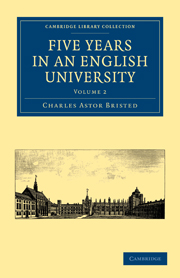Book contents
- Frontmatter
- Contents
- The Cambridge System of Education in its Intellectual Results
- Physical and Social Habits of Cambridge Men.—Their Amusements, &c
- On the State of Morals and Religion in Cambridge
- The Puseyite Disputes in Cambridge, and the Cambridge Camden Society
- Inferiority of our Colleges and Universities in Scholarships
- Supposed counterbalancing Advantages of American Colleges
- The Advantages of Classical Studies, particularly in reference to the Youth of our Country
- What can we, and what ought we, to do for our Colleges
- APPENDIX: Containing Six Exercises for Trinity Declamations, and Three for the Members' Prize
- ERRATA
The Puseyite Disputes in Cambridge, and the Cambridge Camden Society
Published online by Cambridge University Press: 28 April 2011
- Frontmatter
- Contents
- The Cambridge System of Education in its Intellectual Results
- Physical and Social Habits of Cambridge Men.—Their Amusements, &c
- On the State of Morals and Religion in Cambridge
- The Puseyite Disputes in Cambridge, and the Cambridge Camden Society
- Inferiority of our Colleges and Universities in Scholarships
- Supposed counterbalancing Advantages of American Colleges
- The Advantages of Classical Studies, particularly in reference to the Youth of our Country
- What can we, and what ought we, to do for our Colleges
- APPENDIX: Containing Six Exercises for Trinity Declamations, and Three for the Members' Prize
- ERRATA
Summary
“It is not hazarding too much to predict that a school which peremptorily rejects all evidences of religion except such as, when relied on exclusively, the logical canon irreversibly condemns, which denies to mankind the right to judge of religious doctrine * * * must, in the present state of the human mind, inevitably fail in its attempts to put itself at the head of the religious feelings and convictions of Great Britain ; by whatever learning, argumentative skill, and even, in many respects, comprehensive views of human affairs, its peculiar doctrines may be recommended to the acceptance of thinkers.”
—Mill's Logic (1843).The era of my residence in Cambridge was in one respect fortunate : it enabled me to witness a great struggle between reactionary and progressive principles. Anglo-Catholicism and Young England were in all their glory when I arrived there ; they were both pretty well on the wane when I left.
The aim of the Anglo-Catholics (more generally known as the Oxford School, or by the popular nickname of Puseyites) may be briefly characterized thus : it was to bring the Church of England continually nearer to the Church of Rome without actually going into it. But as constructions of this sort, though possible and familiar enough in Mathematics, are not always exactly feasible in real life, it. turned out that many of those concerned in the movement found themselves over the line before they were well aware of it.
- Type
- Chapter
- Information
- Five Years in an English University , pp. 59 - 78Publisher: Cambridge University PressPrint publication year: 2010First published in: 1852



